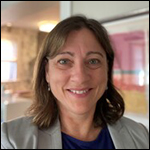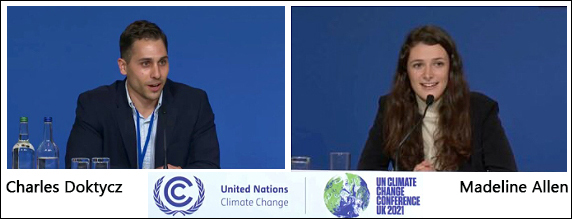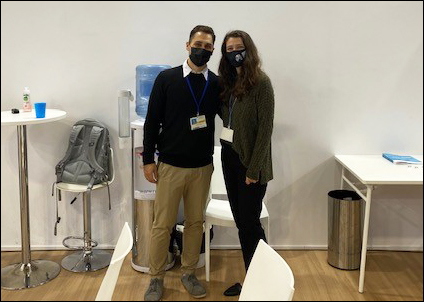Two engineering graduate students and 14 undergraduate students represented Vanderbilt University 3,923 miles away in Glasgow, Scotland, as official delegates to the United Nations international climate change negotiations—dubbed COP26.

The extraordinary opportunity was facilitated by Leah Dundon, director of the Vanderbilt Climate Change Initiative and research assistant professor of Civil and Environmental Engineering. Dundon secured for Vanderbilt official United Nations Observer status in 2019.
The U.N. accreditation enabled Vanderbilt students to attend the conference for a second year, in part through an interdisciplinary A&S Honors Seminar on climate change taught by Dundon.
“Attending these climate change negotiations is an incredible experiential learning and discovery opportunity for students,” said Dundon, also a lecturer in the Earth and environmental science department. “Our group had the opportunity to interact with a wide range of climate scientists, researchers and government leaders and present their own work on the world stage in front of a diverse and sophisticated audience.”
Civil and environmental engineering Ph.D. students Madeline Allen and Charles Doktycz presented on their work with the NSF-supported Youth Environmental Alliance in Higher Education, a project that connects institutes around the world to provide integrated knowledge to students, equipping them to address complex global environmental problems.
“I had the tremendous privilege of speaking in two press conferences (Nov. 3 and Nov. 8) about my experiences as a Fellow with the Youth Environmental Alliance in Higher Education (YEAH), an international NSF-funded network that connects youth around the world and amplifies their voices,” Allen said.
 Allen said one of her favorite moments at COP26 was watching a panel of youth activists speak at the US Center Pavilion, in a session titled, “Climate and Environmental Justice: Youth Leading the Way in the U.S. and Beyond (YouTube video).”
Allen said one of her favorite moments at COP26 was watching a panel of youth activists speak at the US Center Pavilion, in a session titled, “Climate and Environmental Justice: Youth Leading the Way in the U.S. and Beyond (YouTube video).”
“I’m leaving COP26 feeling optimistic and reenergized—excited to continue my research on flood risk and resilience, and to ultimately contribute to the adaptation efforts being developed and implemented around the world.”
Allen’s research interest lies in a more robust comprehension of the science behind risk, resilience, and the built environment, with a strong focus on climate-resiliency of critical infrastructure systems. Her advisor is Mark Abkowitz, professor of civil and environmental engineering and director of the Vanderbilt Center for Environmental Management Studies. “My current research focuses on studying the intricacies of how decisions are made by individuals in relation to their perception of flood risk, and how these decisions ultimately impact adaptation at the community-level scale,” she said.
Doktycz, who began his graduate work at a Master’s student in environmental engineering, is now in his fourth year as a doctoral student. A class with Professor Abkowitz led Doktycz to pursue research with him on risk analysis with respect to climate change. Doktycz’s research focuses on climate change risk analysis, utilizing loss and damage costs of extreme weather events to inform adaptation measures. Abkowitz is Doktycz’s advisor.

This was Doktycz’s second trip to COP. “I went in 2019 working on a project with Leah where I conducted interviews with attendees, asking them to give a message to America youth regarding their personal experiences with climate change. This task led to some eye-opening conversations. It was one thing to learn about the issues, but learning from firsthand accounts in a casual conversation really held much more weight,” he said.
“Presenting at the conference was also an incredible experience. It was such a unique experience to be on the stage discussing the fellowship program Maddy and I are a part of,” Doktycz said. “Particularly because it was a successful presentation that seemed to create a lot of interest in the audience who asked plenty of questions and even asked for interviews.”
The biggest takeaway for Doktycz was the reminder of the diverse perspectives toward climate change. “Not every country has the same motivation because it impacts them differently. Balancing that in sustainable development requires a great deal of compromise.”
Undergraduate Robin Young presented at “Live from the COP,” a YEAH event that brings COP26 developments to YEAH students around the globe who were not able to attend in person. Dundon also presented on the YEAH network and announced Vanderbilt’s new status as an official signatory to the U.N.-backed Race to Zero campaign.
Dundon acknowledges that many young people are extremely distressed at the state of world, with particular concerns around climate change and the environment. “My hope is that my students, and by extension their friends and peers, begin to reframe the problem as one that humans created, and that humans can solve—and in a manner that solves other societal problems as well. There is a lot of reason to be hopeful.”
Dundon underscored how important it was for students to see peaceful international negotiations that spark meaningful problem solving because, while it may be easy to forget, the world is mired by a long history of addressing problems with violence and war. While the negotiation process is slow, it is extraordinarily civil and takes place within a framework centered around meaningful action, Dundon said.
“The value of this experience is not just what we’re learning but how we’re learning it. We’re getting the chance to show up and listen and form opinions and articulate our ideas on a public stage, interacting with people we’ve never met from all over the world,” Doktycz said. “It’s a crucial developmental experience that we’ll take not only into the rest of our academic experience but into our lives and careers.”
In one of the most exciting experiences at COP26, Vanderbilt students engaged directly with members of the U.S. Department of State negotiating team, asking probing questions about their efforts and daily negotiating outcomes. Throughout the conference, students got to observe breakout sessions and discuss the process, strategy and mechanics of diplomatic negotiation with meeting participants. “Seeing international diplomacy in action was an eye-opener and a first for many students,” Dundon said.
“Climate change is very broad and fundamentally interdisciplinary. And the people who have to deal with impacts of climate change and who are working to solve these problems necessarily have perspectives that come from many angles. We’re getting to see that.” – undergraduate participant Robin Young
“It has been so valuable to see how interdisciplinary this issue is—to witness the intersectionality. It all feels so interesting, inspiring and necessary in terms of moving forward.” – undergraduate participant Lily Hauptman
“This Glasgow experience has been amazing and given me hope. It’s shown me the difference between learning something and understanding something. What you learn in a classroom becomes something else—so much bigger and more meaningful—when you see it in the world.” – undergraduate participant Chandler Quaile
Students also engaged in the incredible programming that occurs at country and organizational pavilions, from political discussions among state governors at the U.S. Center to scientific presentations at the Science Pavilion.
“I’m a public policy major and have taken classes related to climate change and to indigenous people’s rights. Seeing the way these different policy issues are coming together at this conference has been very fulfilling for me,” said Brannen Dickson. “This is real-life stuff—it has more truth than what you read in a textbook.”
Coalition building was a broad trend at COP26. In particular, students observing a small group of negotiators discuss methane emissions were amazed to see that by week’s end, what had started prior to COP26 as an announcement between the U.S. and the European Union concluded at COP26 with an additional 103 countries pledging to cut methane emissions by 30 percent by 2030. Dundon’s students experienced firsthand the catalyst for action that was COP26.
In addition to witnessing international diplomacy and hearing from the world’s top climate experts in virtually every discipline, “this is likely one of the most diverse events students will ever experience,” Dundon said. “Interacting with people from nearly 200 countries under the same roof and experiencing so many languages and cultures will be a once-in-a-lifetime event for many, and it reminds us of our global connectedness and the need for action.”
Dundon hopes that participating students and those in her classes have a stronger understanding of how varied and diverse climate change issues are. “My hope is that no matter what career paths these students pursue in the future, they’ll always have an appreciation for how climate change is connected to their discipline, and also retain the optimism needed to pull humanity towards an even better future.”